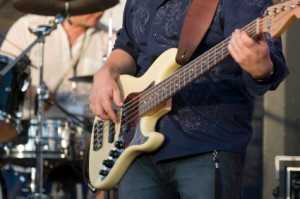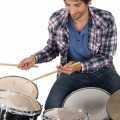Knowing just what to look for in a guitar teacher can sometimes be difficult. There are many things to consider, but the most important factor is that both you and your child are satisfied with the teacher. Here is what to look for when deciding how to choose a guitar teacher before starting guitar lessons:
 1.) Teaching experience – feel free to ask your instructor how many years they have been teaching, how many students they have taught, and the age group(s) they work with the best. While we typically recommend starting drum lessons around the age of seven, a teacher who is experienced with younger children may be suitable to teach a five or six year old.
1.) Teaching experience – feel free to ask your instructor how many years they have been teaching, how many students they have taught, and the age group(s) they work with the best. While we typically recommend starting drum lessons around the age of seven, a teacher who is experienced with younger children may be suitable to teach a five or six year old.
2.) Education – we recommend choosing a guitar teacher who has at least a Bachelor’s degree in music, and can teach a variety of styles, including rock, pop, jazz, and classical guitar. If the teacher does not have a music degree, ask where they received their education or who they studied with, and for how long.
3.) Musical experience – equally important is inquiring about the teacher’s personal experience as a musician and performer. While there is a lot to be learned in the classroom, there is no substitute for the skills learned in concert settings, regardless of whether their background is classical, punk, or jazz. In having a good amount of performance experience, your instructor will have learned how to work with other musicians in a live environment. These skills are crucial in preparation for recitals, auditions, or other similar settings.
3.) Styles offered – a good teacher should be able to teach classical, pop, rock, and also maybe jazz/blues. A big red flag to look for (and one that we look for when we are hiring our instructors) is if the teacher says they only teach one particular style. It would be hard to find a musician who was an expert in every style of playing, but he or she should know the basics for every type of musical genre.
4.) Sheet music or Ear training? – a good guitar teacher should be able to use either sheet music or tablature. Also, the recent popularity of the Suzuki method, which focuses on ear training rather than sight reading, has led some to believe that being able to read music isn’t necessary. This is simply not true, being able to read music is crucial, with ear training being a close second.







